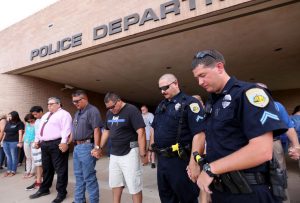 Last weekend, after the murder of three police officers in Baton Rouge, Louisiana, the local police chief and the sheriff used their press conference explaining what happened as an opportunity for a national call to prayer. They didn’t use one of those convenient catch phrases we hear from politicians at times like these (“Our thoughts and prayers go out to the victims and their families.”). This was a heartfelt plea for spiritual healing through prayer.
Last weekend, after the murder of three police officers in Baton Rouge, Louisiana, the local police chief and the sheriff used their press conference explaining what happened as an opportunity for a national call to prayer. They didn’t use one of those convenient catch phrases we hear from politicians at times like these (“Our thoughts and prayers go out to the victims and their families.”). This was a heartfelt plea for spiritual healing through prayer.
In our last post we talked about how people in positions of public and religious service make prayers of their lives—acting in complete openness and service to God’s will. But what happened in Louisiana last week proves that the call for living prayer not only doesn’t diminish the value of spoken prayer, it enhances its power. Verbal prayers help us focus on attaining the spirit needed to prepare for “the final test,” which is a goal Jesus set forth in the prayer he taught us, as documented in this Sunday’s gospel reading (Lk 11:1-13). The Lord’s Prayer was an answer to a disciple’s prayer:
“Lord, teach us to pray just as John taught his disciples.”
This prayer addresses everything we need to support our bodily and spiritual health:
Father, hallowed be your name, your kingdom come. Give us each day our daily bread and forgive us our sins for we ourselves forgive everyone in debt to us, and do not subject us to the final test.”
In other words, deliver us from evil. The police officers and families affected by this latest act of evil need the comfort of knowing that their fellow citizens are of the same mind when it comes to these sentiments. Deliverance from evil starts with us. It requires a new beginning and a quest for innocence that can withstand divine scrutiny.
Our first reading (Gn 18:20-32) recalls Abraham’s repeated prayers to deliver Sodom from its own evil for the sake of the innocent. The problem was and is, mankind lost innocence at its start, thanks to the vanity of believing in the sufficiency of flesh. Realizing this, Abraham pleaded with God: Would you spare Sodom for the sake of 50? 40? 30? 20? 10 innocents?
The answer to this repetitious prayer was yes each time. But what if He had added, “Now go find me those innocents.”? As we know, Sodom’s future was not bright. As St Paul tells the Colossians in our second reading (Col 2:12-14), only one man could be judged truly innocent in the eyes of God, and that was God’s Son—through whom we all won the opportunity to free ourselves from the shackles of the flesh so that our spirits may restore our innocence again.
And even when you were dead in transgressions and the uncircumcision of your flesh, he brought you to life along with him, having forgiven us all our transgressions; obliterating the bond against us, with its legal claims, which was opposed to us, he also removed it from our midst, nailing it to the cross.
Jesus didn’t give us The Lord’s Prayer to hear himself talk. He wanted succeeding generations to hear it, believe it, say it and live it until His Kingdom comes. That’s the kind of prayer all defenders of earthly laws need right now.
–Tom Andel